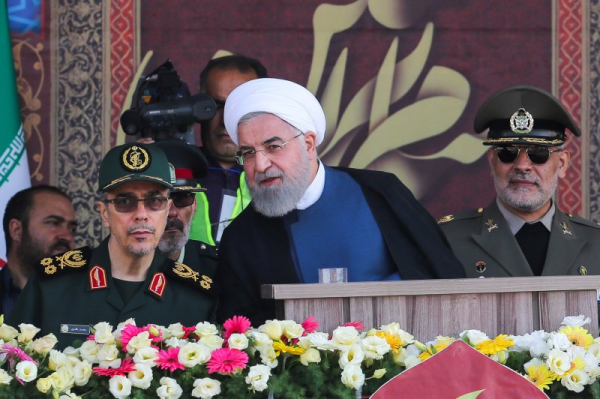
A U.S. State Department spokesman said the United States has sanctioned nearly 50 entities and individuals that comprise a “covert network” used by Iran’s Ministry of Defense and Armed Forces Logistics and the Islamic Revolutionary Guard Corps (leaders pictured with Iran’s then-President Hassan Rouhani in 2019) “to gain illicit access to the international financial system.” File Handout Photo by Iranian President’s Office/EPA-EFE
The federal government Tuesday gave dozens of sanctions to individuals and entities the United States says is part of a “covert network” to gain illegal access to the global financial system in alleged “systemic money laundering” to back Iranian paramilitary activities.
The United States has sanctioned nearly 50 entities and individuals that comprise a “covert network” used by Iran’s Ministry of Defense and Armed Forces Logistics and the Islamic Revolutionary Guard Corps “to gain illicit access to the international financial system,” according to a statement by State Department spokesman Matthew Miller. Advertisement
Founded following Iran’s 1979 revolution, which saw the overthrow of The Shah — Iran’s ruling monarch Mohammad Reza Pahlavi — and installment of a more secular-based government, the IRGC developed into a paramilitary organization separate from the Iranian military.
The U.S. National Counterterrorism Center says the IRGC is tasked with defending Iran’s Islamic regime with its Quds Force, which allegedly is responsible for “covert lethal activities outside Iran.”
The Treasury Department issued in May sanctions against Iranian drone producers tied to the IRGC, which also back Tehran’s proxy militias that commit destabilizing acts throughout the Middle East, including through Hezbollah in Lebanon and Hamas in the Palestinian enclave of Gaza. Advertisement
Miller says Iran’s MODAFL and the IRGC allegedly generate revenue from illicit trade, then leverage a “shadow banking” network of Iranian exchange houses “and dozens of foreign cover companies under their control to flow funds for terrorism and other activities that threaten innocent people around the world.”
Canada in June listed Iran’s elite Islamic Revolutionary Arms Corps as a terrorist entity under its Criminal Code following years of mounting pressure from Iranian Canadians and opposition lawmakers.
“The Iranian regime uses its profits to advance a wide range of destabilizing activities, including terrorism, lethal plotting and transnational repression, the development, procurement, and proliferation of advanced weapons systems, extensive human rights abuses, and nuclear activities that lack any credible peaceful purpose,” Miller wrote.
Specifically, this “shadow banking” revenue, Miller contended, “supports the Iranian regime’s transfer of weapons and funds to its militant proxies and partners in the Middle East region,” which includes the Iran-backed Houthis in Yemen who, Miller added, “continue a campaign of reckless attacks on global shipping, as well as the transfer of deadly weapons to Russia for use in its war of aggression against Ukraine.”
Meanwhile, an expert on Iran called Tuesday’s news “relatively big” sanctions in a social media post. Advertisement
“Goes further than most of the measures seen over the last six months,” Gregory Brew, an author and analyst at Eurasia Group posted Tuesday morning local time on X.
But he added that the sanctions “still avoids the Iran-China oil channel.”